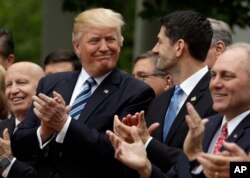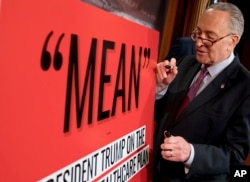U.S. President Donald Trump says he and his Republican colleagues in the Senate are facing "a very narrow path" in their seven-year effort to overhaul the national healthcare reforms championed by former President Barack Obama.
Trump, in an interview that aired Sunday on Fox News, said, "I think we're going to get there," but acknowledged the complicated road in the coming days to "picking a plan that everybody is going to like."
But he contended that the alternative to changing U.S. healthcare policies is the collapse of the law commonly known as Obamacare.
Thursday vote planned
Senate leaders plan to vote Thursday on a measure that would end the requirement that Americans buy health insurance or pay a fine if they do not, phase out federal subsidies to help lower-income people buy insurance, curb taxes on the wealthy and cut hundreds of billions of dollars in funding over the next several years for the government's healthcare program for the poor and disabled.
But Republicans only hold a 52-48 majority in the Senate, with all Democrats expected to vote against the Republican proposal. That means that Republican supporters of the legislation can only lose two Republican votes, with Vice President Mike Pence casting a tie-breaking vote if the Senate splits 50-50.
Republican reluctance
Already five Republican senators have said they cannot vote for their party's plan as it stands now, with four them saying it does not go far enough to curb provisions under the Obama law and one saying the cuts in healthcare payments for the poor go too far.
All appear ready to negotiate changes before the expected vote ahead of the week-long congressional recess around the July 4th holiday celebrating the U.S.'s 18th century independence from England. Other Republican lawmakers have also voiced reservations, casting doubt on the outcome.
Trump said he does not think Republicans voicing objections to the party's proposal are "that far off" from supporting it.
In a Twitter comment Saturday, Trump voiced optimism about passage of the Republican plan, saying, "I cannot imagine that these very fine Republican Senators would allow the American people to suffer a broken ObamaCare any longer!"
He chided Democrats for their opposition to the Republican effort, saying, "Democrats slam GOP healthcare proposal as Obamacare premiums & deductibles increase by over 100%. Remember keep your doctor, keep your plan?"
Under Obamacare, about 20 million more people have been enrolled in insurance plans, many of them under the government's Medicaid program for the poor and disabled, which Republicans now want to cut by more than $800 billion over the coming years even though Trump during his campaign for the White House said he would not curtail it.
Senate Democratic Leader Chuck Schumer criticized the Republican plan as "devastating for the middle class" and said he thinks Republicans have at best even odds of being able to pass the bill. He added that Democrats are willing to work with Republicans to make reforms to the current health care system.
"They want to try it themselves first," he told ABC's This Week. "If they fail, hopefully they'll come sit down. They'll stop sabotaging Obamacare, and sit down with us, and we'll make Obamacare better."
Ever since Obamacare was enacted in 2010 without any Republican votes, House Republicans voted dozens of times to repeal it, a futile effort as long as Obama was president. But repeal of the law could be possible with Republicans in control of the White House and both chambers of Congress.
The leader of the minority Senate Democrats, Senator Charles Schumer, said Sunday that Republicans have "at best a 50-50 chance" of approving their Senate proposal.
If the Senate approves its repeal version, either the House would have to pass the same bill or reconcile its version with the Senate's before Trump could sign it into law.






